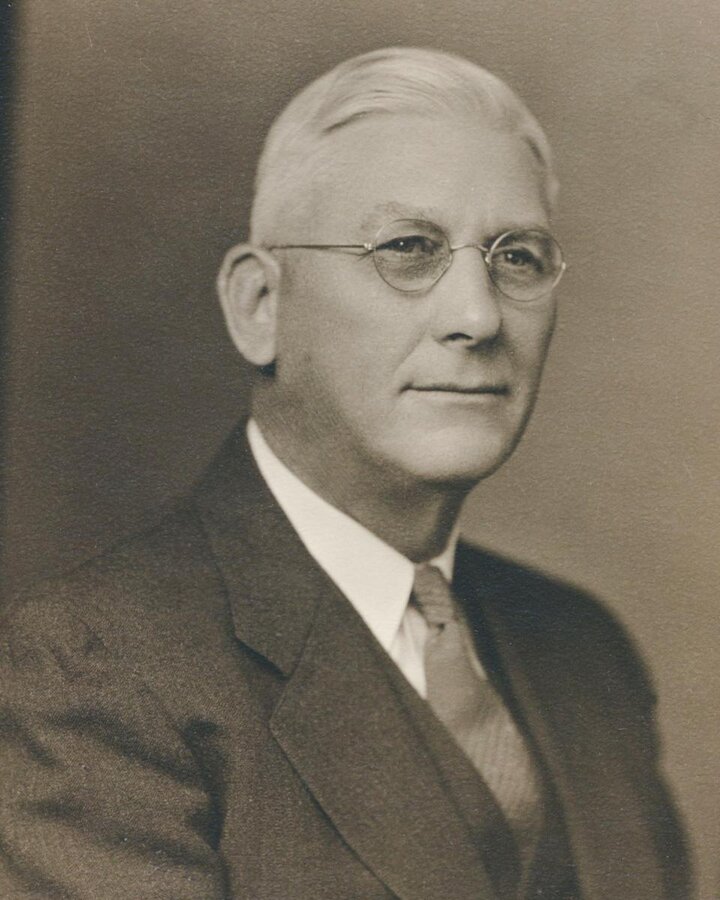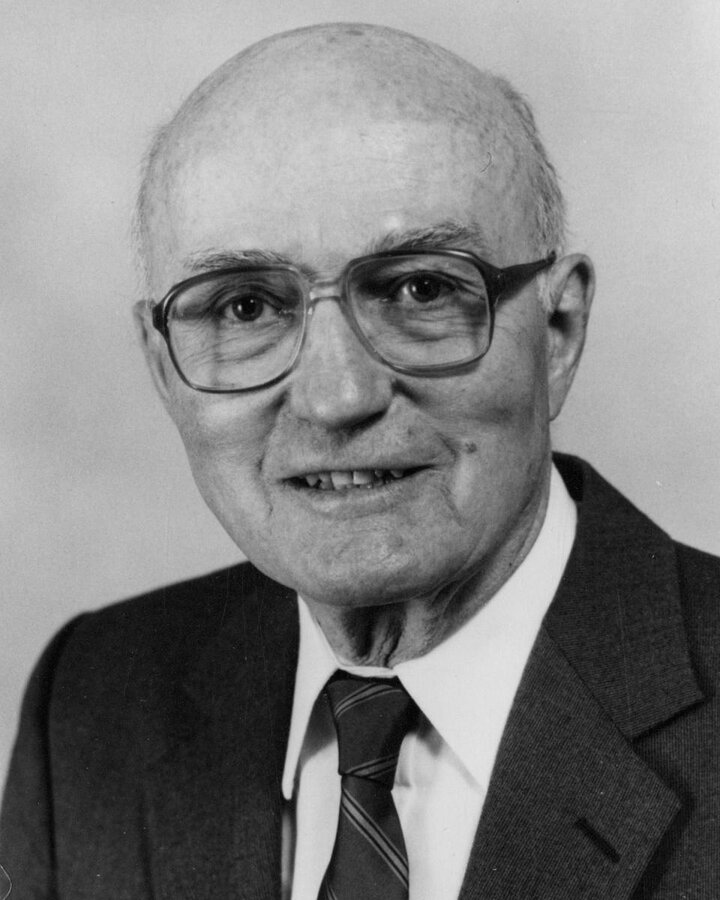The late Theodore Alexander Kiesselbach and David P. McGill, University of Nebraska–Lincoln alumni, received the Department of Agronomy and Horticulture 2023 Alumni Lifetime Achievement Award.
This award is the highest honor bestowed upon graduates of the Department of Agronomy and Horticulture who have made significant contributions to their community, state and nation through professional service, public service and/or civic engagement. The award was founded in 2016 to recognize alumni who have enhanced the reputation of the department and the university by distinguishing themselves in their careers. Honorees are selected by the Agronomy and Horticulture Alumni Advisory Council (AHAAC).

Theodore Alexander Kiesselbach
March 14, 1884 – Dec. 27, 1964
Theodore Alexander Kiesselbach was internationally renowned for his pioneering work in corn crossbreeding, corn hybrids and crop improvement. He played a key role in developing hybrid varieties of corn and helped improve other crops through his team’s research in the Agronomy Department in the College of Agriculture at the University of Nebraska–Lincoln.
Kiesselbach was born on a farm near Shelby, Nebraska, in 1884. When he was four years old, tragedy struck with the sudden deaths of his father, brother and grandfather from illness. His mother, Caroline, leased out the family farm and moved with her five children to Ann Arbor, Michigan. In 1895, after a drought severely reduced their income, the family returned to Nebraska. Caroline left 160 acres of farmland to each of her children with money to fund their college educations.
Kiesselbach graduated with a Bachelor of Arts and a Bachelor of Science in agriculture from the University of Nebraska in 1907 and 1908 and received his master’s and doctorate degrees in agriculture in 1912 and 1918. He trained with the late Charles Bessey, professor of botany at Nebraska.
Kiesselbach married high school friend and Nebraska alumna Hazel Hortense Hyde in 1909. They had four children.
After finishing his degree, Kiesselbach had planned to return to his inherited farmland near Shelby. Instead, he took a job in Lincoln after being told by Hazel's father that farm life would not suit her.
Kiesselbach accepted a graduate assistant position as an assistant with Edward G. Montgomery, then head of the University of Nebraska Agricultural Experiment Station. He worked on a project making thousands of plant growth measurements for corn experiments.
He joined the faculty at Nebraska first as a field crops instructor in 1909, a professor of experimental agronomy in 1912, and a professor of agronomy in 1917, a position he held until his retirement in 1952.
In 1909, he attended the National Corn Exposition in Omaha, Nebraska, where he saw scientists, George A. Schull and Edward M. East, lecture on hybrid corn, seen at that time as dangerous. Kiesselbach and Montgomery initiated work on crossbreeding corn and in 1913 became the first scientists to develop corn hybrids west of Connecticut. After several devastating droughts, Kiesselbach's hybrid became popular in the 1930s, and by 1949, accounted for $42 million of Nebraska's crop income.
Kiesselbach was a tireless researcher and author and was recognized worldwide for his publication "The Structure and Reproduction of Corn", published in 1949 as a Nebraska Agricultural Experiment Station Research Bulletin. It became a seminal reference for plant scientists and was widely adopted. In 1980, the University of Nebraska Press republished the article as a book and printed another edition in 1999 for the publication’s 50th anniversary. He also authored more than 140 publications on crop research including corn hybrids, alfalfa and wheat breeding, and chemical bindweed control.
He was elected as a Fellow of the American Society of Agronomy in 1927. He received the Hoblitzell National Award in Agricultural Sciences in 1951 and Nebraska Crop Improvement Association Agronomy Award in 1952. In addition, he held memberships in the Nebraska Corn Improvers Association, Sigma Xi, Gamma Sigma Delta, American Society of Agronomy, Nebraska Academy of Science, and many other organizations.
The University of Nebraska dedicated the Kiesselbach Crops Research Laboratory in his honor in 1969.

David P. McGill
September 03, 1919 – October 5, 2009
David P. McGill is considered one of the most noted teachers in the history of the College of Agricultural Sciences and Natural Resources at the University of Nebraska–Lincoln. During his 33-year career, he taught genetics to more than 8,000 students and served as an adviser to individual students and student organizations. He had an enduring impact as a teacher because he focused on his students and had a strong desire to see them succeed in learning.
McGill was born on a Lancaster County farm in 1919. He graduated from Waverly High School, having taken most of the vocational agriculture courses offered. He was also active in 4-H.
He graduated with a Bachelor of Science degree in 1941 from the Department of Agronomy at Nebraska. He earned his way through by working in the dairy department and agronomy department and doing off-campus yard work. After graduation he took a position with the Soil Conservation Service in Pawnee County where he remained until 1942, when he was drafted into the United States Army.
In 1944, McGill went overseas as motor officer with a Battalion Headquarters Company of the 78th Infantry Division. Having attained the rank of captain, he was separated from active duty in April 1946 and returned home.
He then began working in research at Nebraska’s agronomy department. He earned his master’s degree in agronomy in 1950 at Nebraska and his doctorate degree in 1955 at Iowa State University.
When the late agronomy professor Franklin D. Keim, who had been the lead teacher in the agronomy introductory genetics course, died suddenly in the spring of 1956, McGill was asked to take over. He had little experience teaching, but being a talented and versatile individual, he adapted readily to his new responsibility. Teaching genetics was his primary assignment from then until he retired in 1989.
McGill’s genetics classes typically consisted of over a hundred students, including students from other colleges of the university. By the third week of classes, McGill would know every student by name. His course was not easy and was considered demanding. He was famous for his sense of humor and his oral quizzes. McGill knew his subject well and his presentations were considered logical and very clearly done. He kept up to date in subject matter by reading current pertinent genetics literature, and by participating in teaching conferences and attending short courses.
In spite of the great diversity and the varying backgrounds of his students, he had the capability of bringing along all who made a reasonable effort to learn. There was no limit to the time he would spend with students who came to him for individual help. Year after year, students ranked McGill ‘No. 1’ on the College of Agriculture campus.
The late William Colville, Nebraska agronomy professor, wrote that McGill had “...the ability to motivate and challenge ‘the dull and the bright’ to want to learn.”
McGill implemented a weekly lab into the genetics course which featured genetics problem solving and genetics experiments. This model is still used today in the Plant and Landscape Systems 215 Genetics course.
“When I interviewed for the genetics teaching position, I asked Dr. McGill about the students who would be taking the genetics course,” said Don Lee, professor of agronomy. “He responded by saying ‘The students are not perfect genetics students, but you will like them.’”
In 1963, McGill took on a part-time role as assistant to the late Elvin F. Frolik, Dean of the College of Agriculture, now called the Vice Chancellor of the Institute of Agriculture and Natural Resources.
He continued to serve in this capacity under the next three IANR Vice Chancellors Duane Acker, Martin Massengale and Roy C. Arnold.
McGill also served as interim head of the Department of Agronomy for six months while working as assistant to Arnold. At the end of the six months, the university was in budget reductions and McGill sensed that the faculty felt administration should join the departments in taking a cut. Accordingly, he advised Arnold that his assignment in the Vice Chancellor's office be terminated.
McGill has received numerous honors. A few of these include the University of Nebraska Teaching Award; the American Society of Agronomy Distinguished Teaching Award; the national FarmHouse Fraternity Builder of Men Award ; the Lawrence K. Crowe Outstanding Student Advisor Award; the College of Agricultural Sciences and Natural Resources Distinguished Teaching Award and the Doc Elliot Award.
A hard red winter wheat developed cooperatively by the University of Nebraska and the USDA-ARS is named for McGill and developed as NE01481.